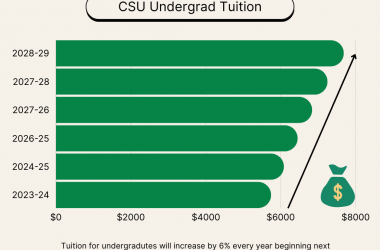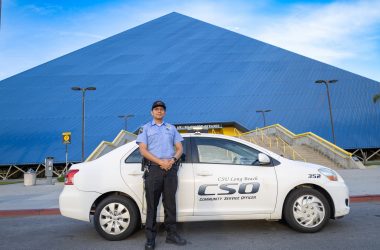The Cal State Long Beach Academic Senate may vote today on a new office hours policy that would allow faculty to conduct half of their student advising face-to-face and half of it electronically.
However, Norbert Schürer, English professor and member-at-large of the Executive Committee of the Academic Senate, said the Senate is still discussing what electronic communication entails.
He added that the electronic office hours in the proposed policy would not include time spent responding to e-mails, which is one challenge that will be discussed at today’s Academic Senate meeting, Schürer said.
Schürer said one problem or question that arises is whether or not the policy takes into account regular emails.
“For example, [emails] that a professor sends when he or she isn’t in his [or her] office hours,” he said. “Some professors are sending out as many as 500 emails; those are additional hours a professor puts in of their own time.”
The current office hours policy hasn’t been updated since 2002 according to the Academic Senate website.
“The amount of hours professors will be available will not change, the policy should only improve them,” Schürer said. “In a way, it makes faculty more available.”
Schürer said the new form of office hours could be useful in this day and age of technology, considering many students prefer to communicate through the Internet.
“I usually just sit there and maybe get one or two people that come in for office hours,” Schürer said. “I’ve heard some students don’t even read emails anymore.”
Cynthia Leathers, the program coordinator for Languages Other Than English (LOTE), said she sees many students during her office hours, but admits that a majority of communication with students is done through email.
“Email is so helpful and students clarify so much through email,” Leathers said. “Professors have so much work and we’re just going to schedule our hours around the needs of our students.”
Isabella Valbuena, a freshman engineering major, said she thinks visiting a teacher face-to-face can be intimidating and would also like to have the proposed electronic office hours available.
“When you email professors, you know they’ll be at their computer,” she said. “You don’t have to wait and having that time there for you gives you that reassurance that they might get back to you quicker.”
Mayra Garcia, a senior public health major, said even though she doesn’t attend her professor’s office hours, she thinks the proposed policy is flawed.
“Generally, I don’t like to talk to [professors] face-to-face, but I do think electronic office hours can be crippling for those who don’t have access to computers or internet at home,” Garcia said.
Bruce Perry, a geology and oceanography professor, describes his office-hour traffic as cyclical, but said even with a new policy, he wouldn’t change the way he conducts his hours very much.
“I’m real big on face-to-face interaction with my students,” Perry said. “I think it’s valuable for me and for them; that’s the way I’ve always conducted it.”
William Metscher, a sophomore marine biology major, said he doesn’t think electronic office hours will prove as rewarding as face-to-face ones either.
“I think online office hours [are] a nice idea on paper, but I don’t think it would be the same feeling as going to see a professor and talking to them,” Metscher said. “When you have a large lecture hall, you’re really detached from the professor and office hours is a nice way to connect with them and get a different opinion.”
Jeff High, a German studies professor, said he can see why the policy may be beneficial, but will also continue to hold his office hours in the same manner he always has.
“It’s the most exciting part of my job, advising students,” High said. “I don’t think the policy will affect me at all. I spend many times the number of hours that are required advising students, and will continue to do so online and in the office.”
He said, however, that he could imagine circumstances where it might be necessary to create another avenue of communication.
“[It’s good to] recognize the incredible amount of time faculty spend on email or Internet advising, but at the same time, any excuse to reduce contact between students and professors is not going to be good,” High said.



